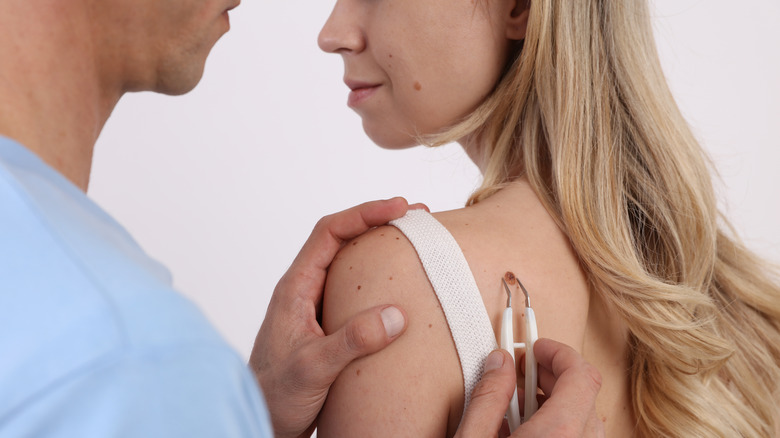Does Apple Cider Vinegar Really Work To Remove Skin Tags?
Skin tags are small, noncancerous growths that develop on the surface of the skin. They're usually flesh colored, but can sometimes look darker in appearance (via Healthline). While skin tags are common and harmless, some people may want to have them removed for aesthetic reasons. As a result, there are many different at-home treatments circulating online, including the application of apple cider vinegar.
Some people believe that apple cider vinegar's acidic properties can help break down and remove skin tags from the body. The process involves soaking a cotton ball in apple cider vinegar and applying it to your skin tag with a bandage for 10 to 15 minutes. It is said that this method must be repeated every day for two weeks in order for it to work.
However, there is no scientific evidence to support this claim. In fact, it may even harm your skin. According to a 2015 report published in the Journal of Clinical and Aesthetic Dermatology, a teenage girl experienced erosions on her skin after applying apple cider vinegar to a mole on her nose.
Don't remove your skin tag at home
It is best to skip any DIY treatments and visit a dermatologist instead. If you try to remove a skin tag on your own, you can end up irritating and damaging your skin, which may even lead to infection (via Cleveland Clinic). In a clinical setting, however, dermatologists can correctly and safely remove your skin tag without causing any damage to the surrounding area.
Fortunately, skin tags can easily be removed in-office by clipping or cutting them off. "I like the method of snipping best because it's clean and the skin tags are gone by the time the patient leaves," dermatologist Dr. Pamela Ng told Cleveland Clinic. Other methods of professionally removing skin tags include electrodessication and freezing. Electrodessication involves drying out the skin tag with a needle-like electrode. Freezing, on the other hand, involves applying liquid nitrogen to the skin tag to make it fall off, according to Medical News Today.


